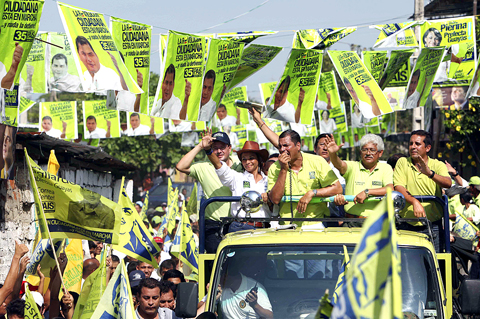Ecuadoran President Rafael Correa’s radical transformation of his historically unstable nation, including a new Constitution that would grant him greater powers, is expected to propel the leftist economist to easy re-election tomorrow.
The 46-year-old Correa, who blames the global economic crisis on capitalism’s “structural flaws,” has spooked foreign investors with a moratorium on debt payments and tough dealings with oil companies and other multinationals.
He has imposed some of the world’s strictest protectionist measures to shield local industries, leading to criticism that his huge social spending agenda could bust the Treasury as recession takes hold this year.

PHOTO: AP
But it is precisely such actions that have made Correa, a little-known economy minister just four years ago, so popular.
“Let’s bury the party-docracy,” he told supporters on Thursday night as campaigning ended, his buzzword for the corrupt traditional politics that he has long eschewed.
Since taking office in January 2007, Correa has tripled state spending on education and health care, doubled to US$30 a monthly payment for single mothers and launched subsidy programs for small farmers and people building their own homes.
Pre-election polls show Correa more than 20 percentage points ahead of his closest rival, former president and coup leader Lucio Gutierrez. Banana magnate Alvaro Noboa was running a distant third.
To win without forcing a runoff, Correa needs more than 50 percent of the vote or at least 40 percent with a 10-point margin over his closest competitor.
Under the country’s new Constitution, approved by 64 percent of voters in a September referendum, Correa would be eligible to run for a second consecutive four-year term in 2013. His current four-year term was automatically truncated by the new Constitution.
Voters tomorrow will also choose mayors, governors and a new 124-seat National Assembly. The new constitution also lowers the voting age to 16 and for the first time permits soldiers, police and prison inmates to vote.
Correa’s critics acknowledge his popularity but warn that like his ally, Venezuelan President Hugo Chavez, he benefited politically from oil prices that skyrocketed last year but have since come down to earth.
Ecuador’s oil-based economy grew 6.5 percent last year the government says, but petroleum revenues have dropped 67 percent in the first quarter of this year.
Correa’s governing model “has been successful in its redistribution of wealth and for directing resources to social programs but not so successful in creating new types of productivity,” said Vladimir Sierra, head of the sociology department at Quito’s Catholic University.

In the sweltering streets of Jakarta, buskers carry towering, hollow puppets and pass around a bucket for donations. Now, they fear becoming outlaws. City authorities said they would crack down on use of the sacred ondel-ondel puppets, which can stand as tall as a truck, and they are drafting legislation to remove what they view as a street nuisance. Performances featuring the puppets — originally used by Jakarta’s Betawi people to ward off evil spirits — would be allowed only at set events. The ban could leave many ondel-ondel buskers in Jakarta jobless. “I am confused and anxious. I fear getting raided or even

Eleven people, including a former minister, were arrested in Serbia on Friday over a train station disaster in which 16 people died. The concrete canopy of the newly renovated station in the northern city of Novi Sad collapsed on Nov. 1, 2024 in a disaster widely blamed on corruption and poor oversight. It sparked a wave of student-led protests and led to the resignation of then-Serbian prime minister Milos Vucevic and the fall of his government. The public prosecutor’s office in Novi Sad opened an investigation into the accident and deaths. In February, the public prosecutor’s office for organized crime opened another probe into

RISING RACISM: A Japanese group called on China to assure safety in the country, while the Chinese embassy in Tokyo urged action against a ‘surge in xenophobia’ A Japanese woman living in China was attacked and injured by a man in a subway station in Suzhou, China, Japanese media said, hours after two Chinese men were seriously injured in violence in Tokyo. The attacks on Thursday raised concern about xenophobic sentiment in China and Japan that have been blamed for assaults in both countries. It was the third attack involving Japanese living in China since last year. In the two previous cases in China, Chinese authorities have insisted they were isolated incidents. Japanese broadcaster NHK did not identify the woman injured in Suzhou by name, but, citing the Japanese

RESTRUCTURE: Myanmar’s military has ended emergency rule and announced plans for elections in December, but critics said the move aims to entrench junta control Myanmar’s military government announced on Thursday that it was ending the state of emergency declared after it seized power in 2021 and would restructure administrative bodies to prepare for the new election at the end of the year. However, the polls planned for an unspecified date in December face serious obstacles, including a civil war raging over most of the country and pledges by opponents of the military rule to derail the election because they believe it can be neither free nor fair. Under the restructuring, Myanmar’s junta chief Min Aung Hlaing is giving up two posts, but would stay at the